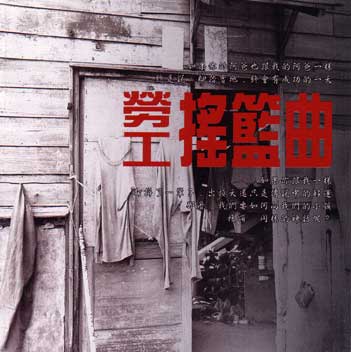Labor Lullaby
 Early in 2002 I came across a web site of an organisation called "Taiwan
Labor Front" and discovered that they had produced a CD of union songs
called "Labor Lullaby". I tracked down a source of this CD and
was very exited to receive a copy. There are 12 tracks in a number of lanquages:
Hakka, Holo, Amis, Mandarin. The song styles vary too, from regional traditional
folk song to local versions of country and western, rock, nakasi and rap.
Early in 2002 I came across a web site of an organisation called "Taiwan
Labor Front" and discovered that they had produced a CD of union songs
called "Labor Lullaby". I tracked down a source of this CD and
was very exited to receive a copy. There are 12 tracks in a number of lanquages:
Hakka, Holo, Amis, Mandarin. The song styles vary too, from regional traditional
folk song to local versions of country and western, rock, nakasi and rap.
Labor Lullaby was published on May 1 2000 and the song titles translate as follows
- What Are We (Still) Waiting For?
- Bad Mood
- Voice of the Indigenous Peoples
- Poor, the Strength Gone
- Doing Labor for Others
- The Joy of Being Lazy
- A-Mei's Store
- Flower Girl
- Unemployed Man
- Labor March
- Karaoke version of track 4
- Karoke version of track 2
The performers include Labour Exchange Band, A-Tiong and Jiang Jin-Sing.
Tranlator (Henry H. Tan-Tenn)
The translations provided here tend to be literal. Song titles within
brackets are transliterations in the main language of a given song. Where
more than one language is used, language names are listed in the sequence
in which they appear. A language name is listed only if words appear in
significant quantity. Holo, for example, is not listed for song 5 as it
uses no more than a few phrases of it. Translator's comments are information
not found on the album and include websites, biographical notes.
Album Title: Labor Lullaby [Lau-gong Yao-lan-cyu]
Length: 46:26
Publisher: Taiwan Labor Front (May 1, 2000)
Track: 1
Song Title: What Are We (Still) Waiting Here For [Ngai-ten Han Ti Ya Ten
Mak-kai]
Language(s): Hakka
Lyrics:
---
Brothers and sisters who earn the wages
Now the jobs have become worse and worse still.
Because the capitalists, they have
Banded together.
The propertied class is full of bliss.
They've fooled [?] the government, set up the media
Cursed the fortune of our livelihood.
Brothers and sisters who earn the wages
Why are we waiting here for like idiots.
Brothers and sisters who live off the wages
Now the wages are thinner and thinner still.
Because the capitalists, they have
Crossed the seas and courted each other.
The faces of capitalism are full of content.
They've moved the capitals, laid off the workers, shut down the factories
Imported foreign labor to incite dog fights.
Brothers and sisters who live off the wages
Why are we waiting here for, dazed.
-----
Lyrics by:
Music by:
Arrangement by:
Performed by: Labor Exchange Band
Description:
Translator's comment: http://www.leband.net/
Track: 3
Song Title: Voice of the Indigenous Peoples [Yuan-jhu-min de Sin-sheng]
Language(s): Mandarin; Amis (3rd verse)
Lyrics:
The Aborigines on Taiwan, by nature joyful, diligent, people-loving,
In the cities to realize their ideals,
Every morning leaving early coming home late, in order to survive.
Friends, please hear their voices.
The Aborigines in the cities, not afraid of the wind, the rain, the big
sun.
They’re searching for their ideals.
At night they gather at home, to drink a cup of old rice wine from home-country.
Friends, see the purity of their heart.
[3rd verse sung in Pangcah, not translated.]
Lyrics by: Jiang Jin-Sing
Music by: Jiang Jin-Sing
Arrangement by: Jhang Jheng-Siong
Performed by: Jiang Jin-Sing
Description: n/a
Translator's comment: Amis is an indigenous Austronesian language in Taiwan.
Jiang is the eldest son of the late Difang and Inai, the Amis huband-and-wife
dual whose performance was stolen by Enigma in their 1993 hit "Return
to Innocence". His other works can be heard at [http://www.watahope.org.tw/feijuyuenbao/cd_media/cd07.htm]
According to this site, Jiang specializes in Nakasi, originally a Japanese
form, strongly associated with traditional working class culture in Taiwan.
Track: 7
Song Title: A-Mei's Store [A-Mei de Dian]
Language(s): Mandarin
Lyrics:
I call her A-Mei.
Because she’s the owner of A-Mei Food Shop. She makes good dishes;
her person draws me even closer to her. She often wears black stocking
and twenty-dollar slippers, asking us what we’re ordering. Then
swiftly she turns, fry pan in her right hand, ? in her left. Every night
at mid-night when I go home, it’s become my habit to see her sitting
in the shop, legs crossed, smoking a cigarette, eating appetizers, reading
the paper; only then is my day complete. She’s my idol; I always
say so to my friends.
A-Mei has about her something I much respect, maybe it’s the way
she carries herself, though I can’t quite describe it. Maybe it’s
the combination of resilience and a strong will, the vitality of life.
And that’s the kind of beauty in Taiwanese women I am familiar with.
At night seeing her sitting alone by the shop front, smoke swirling out
of her mouth, her eyes focused on the distance beyond me, I’d like
to ask her, “A-Mei, what’s on your mind?”
Lyrics by: Jhu Sin-Ying
Music by: Jhu Sin-Ying
Arrangement by: Jhu Sin-Ying, Syu Chang-Da
Performed by: Jhu Sin-Ying
Description:
Translator's comment: Twenty NT is less than one USD. These food shops
are small family-owned, family-run restaurants found everywhere in Taiwan.